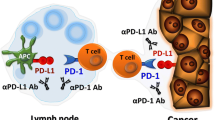Similar content being viewed by others
References
Leach DR et al. (1996) Enhancement of antitumor immunity by CTLA-4 blockade. Science 271: 1734–1736
Mueller DL et al. (1989) Clonal expansion versus functional clonal inactivation: a costimulatory signalling pathway determines the outcome of T cell antigen receptor occupancy. Annu Rev Immunol 7: 445–480
Waterhouse P et al. (1995) Lymphoproliferative disorders with early lethality in mice deficient in Ctla-4. Science 270: 985–988
Quezada SA et al. (2006) CTLA4 blockade and GM-CSF combination immunotherapy alters the intratumor balance of effector and regulatory T cells. J Clin Invest 116: 1935–1945
Zeh HJ III et al. (1999) High avidity CTLs for two self-antigens demonstrate superior in vitro and in vivo antitumor efficacy. J Immunol 162: 989–994
Hodge JW et al. (2005) Multiple costimulatory modalities enhance CTL avidity. J Immunol 174: 5994–6004
Attia P et al. (2005) Autoimmunity correlates with tumor regression in patients with metastatic melanoma treated with anti-cytotoxic T-lymphocyte antigen-4. J Clin Oncol 23: 6043–6053
Small E et al.; A phase I trial of CTLA-4 blockade with human anti-CTLA-4 (MDX-010) in patients with hormone refractory prostate cancer. Clin Cancer Res, in press
Fong L et al. (2006) A phase I trial of combination immunotherapy with CTLA-4 blockade and GM-CSF in hormone-refractory prostate cancer [abstract]. J Clin Oncol 24: 2508
Gerritsen W et al. (2006) A dose-escalation trial of GM-CSF-gene transduced allogeneic prostate cancer cellular immunotherapy in combination with a fully human anti-CTLA antibody (MDX-010, ipilimumab) in patients with metastatic hormone-refractory prostate cancer (mHRPC) [abstract]. J Clin Oncol 24: 2500
Author information
Authors and Affiliations
Corresponding author
Ethics declarations
Competing interests
The authors declare no competing financial interests.
Rights and permissions
About this article
Cite this article
Gulley, J., Dahut, W. Future directions in tumor immunotherapy: CTLA4 blockade. Nat Rev Clin Oncol 4, 136–137 (2007). https://doi.org/10.1038/ncponc0749
Received:
Accepted:
Issue Date:
DOI: https://doi.org/10.1038/ncponc0749
- Springer Nature Limited




